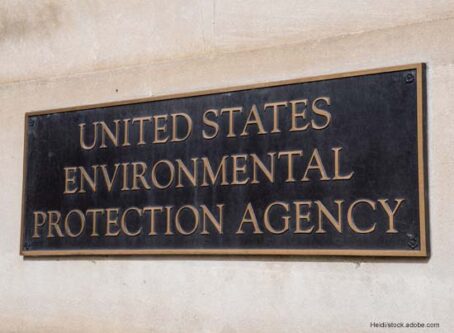GOP lawmakers introduce resolution to undo EPA’s new emission standards
Republicans in Congress are trying to dismantle the U.S. Environmental Protection Agency’s new truck emission standards.
On Wednesday, May 1, Sens. Pete Ricketts, R-Neb., and Dan Sullivan, R-Ark., along with Rep. John James, R-Mich., held a press conference announcing they are introducing Congressional Review Act (CRA) resolutions to invalidate the EPA’s latest rules setting stricter emission standards for both heavy-duty trucks and passenger vehicles. Ricketts and James introduced the CRA for the light- and medium-duty vehicles rule. Sullivan and Rep. Russ Fulcher, R-Idaho, introduced the CRA for the heavy-duty vehicles rule.
During the news conference, the lawmakers referred to the rules as an EV mandate and called the regulations “delusional.” The Republican-led charge against the emission standards claims the relatively high costs of electric vehicles will “decimate” middle-class and lower-income Americans while being reliant on China for batteries. In a news release, James called the emission rules “comply-or-die electric vehicle mandates.”
Although Wednesday’s announcement focused on the light- and medium-duty emission rule, efforts to overturn President Joe Biden’s emission standards include the heavy-duty truck emission rule. Sullivan concluded his remarks with a statement from the Owner-Operator Independent Drivers Association.
“Small-business truckers make up 96% of trucking and could be regulated out of existence if the EPA’s misguided mandate comes into effect,” OOIDA President Todd Spencer said in the statement. “This could have devastating effects on the reliability of America’s supply chain and ultimately on the cost and availability of consumer goods. Local mom-and-pop trucking businesses would be suffocated by the sheer cost and operational challenges of effectively mandating EV trucks. We thank Sen. Ricketts and Sen. Sullivan for their leadership in Congress in standing up for America’s small-business truckers to fight EPA’s unworkable emission regulations.”
New truck emission standards
EPA’s new truck emission standards will effectively force 25% of new sleeper-cab tractor sales to be zero-emission vehicles by 2032.
Commonly referred to as “zero-emission” trucks, electric and hydrogen-fueled trucks are actually “zero-direct-emission” vehicles, as defined by the Department of Energy. Although emission measured on a tailpipe basis (direct) may be zero, emission related to battery production, distribution, recycling and disposal do not have a net-zero result.
Truck emission standards vary by vehicle type. Light heavy-duty (Class 2b-5) vocational trucks, for example, have the most stringent standards, requiring 60% be zero-emission by 2032.
| Model year: | 2027 | 2028 | 2029 | 2030 | 2031 | 2032 |
| Light-heavy vocational | 17% | 22% | 27% | 32% | 46% | 60% |
| Medium-heavy vocational | 13% | 16% | 19% | 22% | 31% | 40% |
| Heavy-heavy vocational | — | — | 13% | 15% | 23% | 30% |
| Day-cab tractors | — | 8% | 12% | 16% | 28% | 40% |
| Sleeper-cab tractors | — | — | — | 6% | 12% | 25% |
According to the EPA, the final truck emission standards will avoid about 1 billion metric tons of greenhouse gas emission from 2027 through 2055. The federal government also claims that the heavy-duty industry will see annualized savings of $3.5 billion compared to annualized costs of about $1.1 billion.
Legal challenges?
With the Congressional Review Act unlikely to succeed, another avenue to invalidate the new truck emission standards is through the courts.
A CRA resolution is an oversight tool Congress can use to overturn agencies’ rules. However, it requires passage in both chambers of Congress and a signature from the president or a supermajority in Congress to override a presidential veto. Since CRA resolutions are typically partisan in nature, they rarely survive.
Out of the more than 250 resolutions introduced between 1996 and 2022, only 20 have been successful – 16 of those during former President Donald Trump’s first year in office, when Republicans controlled both the legislative and executive branches. Currently, Republicans have only a slim majority in the House.
However, an agency rule can be challenged in court by virtually anyone who feels it violates the law or constitution. Since the EPA’s truck emission rule just recently became official, no lawsuits challenging it have hit the federal court docket … yet.
In a joint statement following the announcement of the new rule, the American Petroleum Institute and American Fuel and Petrochemical Manufacturers indicated they are poised to take legal action if necessary.
“By moving forward with an extreme reliance on so-called heavy-duty zero-emission vehicles, this rule disincentivizes the development of other fuel-based technologies – including American-made renewable diesel – that are working in today’s heavy-duty fleet to reduce emissions more quickly and at a lower cost,” the oil and gas associations said in a statement. “This misguided rule should be overturned by Congress, but short of that, our organizations are prepared to explore challenges in court.”
Federal courts have been mixed when it comes to similar challenges to emission rules. In March, a federal court in Texas struck down a new Federal Highway Administration rule establishing transportation-related greenhouse gas emission performance measures. Two weeks later, the U.S. Court of Appeals for the District of Columbia Circuit rejected a bid by 17 Republican-led states and several oil groups to overturn California’s ability to set stricter emission standards. LL









